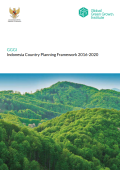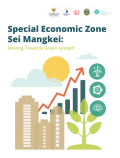This paper aims to mainstream green growth within Indonesia’s economic planning and development processes. To this end, the Green Growth Programme is developing a framework and toolkit that can be used by a variety of government agencies, especially those involved in planning and economic activities.
This case study exhibits the compilation of experimental Indonesia energy flow accounts, which are intended to broaden the coverage of accounts in Sisnerling (Indonesian Integrated System of Economic and Environment Accounts). This report contains various accounts describing the supply and use of energy by the environment and economic units as well as air emissions released to the environment as a result of energy use activities.

This Country Planning Framework (CPF) is a high-level document guiding the Global Green Growth Institute's (GGGI) joint program with the Government of Indonesia (GoI).

This case study Indonesia: su-re.coffee - Synergizing climate change mitigation and adaptation through supporting farmers in utilizing clean bioenergy and climate-smart agriculture shows an approach to addressing the exacerbation of high energy consumption on rural households and farmer reliance on rice paddies.

In supporting the government to attract green investment flows into SEZs, GGGI conducted a green growth assessment study for Sei Mangkei, North Sumatra, to scope out investment opportunities and screen potential projects for further development into eligible bankable green projects using the method of extended Cost Benefit Analysis (eCBA).

Bandung Metropolitan Area (BMA) is home to 8.6 million people and is Indonesia’s second-largest urban agglomeration. Rapid growth has created a number of challenges for the city, including traffic congestion, air pollution, municipal solid waste and water access and management. The BMA also faces several acute disaster risks primarily related...
In late 2009, Indonesia made a voluntary commitment to reduce its greenhouse gas emissions by 26 per cent by 2020, or by 41 per cent with international assistance, compared to business as usual. The country aims to achieve 87 per cent of this goal by reducing emissions from deforestation and...
